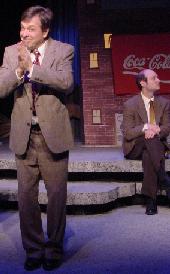SEARCH
REVIEWS
FEATURES
NEWS
Etcetera and
Short Term Listings
LISTINGS
Broadway
Off-Broadway
BOOKS and CDs
OTHER PLACES
Berkshires
London
LA/San Diego
Philadelphia
Elsewhere
QUOTES
On TKTS
LETTERS TO EDITOR
FILM
LINKS
MISCELLANEOUS
Free Updates
Masthead
Writing for us
A CurtainUp Review
Klonsky and Schwartz
| My mother named me after a Pullman car. She thought it sounded Goyishe --- Delmore Schwartz |

John FitzGibbon and David Volin in Klonsky and Schwartz
|
The play focuses on Schwartz’ declining sanity after he has left his job at Syracuse University to write poetry and live in New York City. Imagining that his wife was stolen by Nelson Rockefeller and believing he was told what to do by Dybbuks (plural), Schwartz is nevertheless urged by Klonsky to think rationally, to recall his childhood as the son of irrational unhappily married Romanian immigrants.
Schwartz’s mental instability is dramatized in fits and starts following his release from Bellevue as a kind of neurotic vaudeville act (shades of Smith and Dale on speed) as the two writers review the high and low points of their tight but testy relationship. The fast staccato paced dialogue is unleashed by the maniacally envious Klonsky and the maniacally depressive Schwartz in a lyrical point counter point style. Each man is afforded his own time in the spotlight, each confronted by his own demons. Their unlikely friendship began after Klonsky has submitted a poem in a contest judged by an expectedly condescending Schwartz. As egomaniacal as he was brilliant, Schwartz’s influence on the 10 years younger Klonsky proved profound, even as it served to block Klonsky’s creative flow ("You think any nutball idea that comes into your head is poetry and you can't tell the difference.")
The play moves speedily through brief scenes that focus more on the men's r emotional instability than on their intellectual gifts. Both marry and divorce, Schwartz twice. As they concede in concert: "Why should I make one Jewish girl miserable when I can make a hundred shicksas happy."
Although he doesn’t get the opportunity to rant and rave like his co-star, Volin is impressive as the more conventionally dysfunctional Klonsky, whose preoccupation with horse racing and womanizing may also have led to the artistic paralysis that consumed him during his friendship with Schwartz. When you have friends like Schwartz who tells him, "You’re just a prick, posing as a poet," you don’t need a bad review from a literary critic.
Fitzgibbon has the tougher assignment as he has been apparently encouraged by director Suzanne Barabas to enforce and validate Schwartz’s nutty behavior (that includes drunken binges and waving a loaded gun around in Bryant Park), with an excess of flailing hands and nervous body tics. One can’t say that Fitzgibbon isn’t acting up a storm.
Various locales are simply established within Jessica Parks’ setting featuring a neon-lit cityscape. The quirky structure of the dialogue, some of it almost singspiel in delivery, suggests that Linney sees his play as a lyrical convergence of these commiserating but creative poet/writers. The delivery is sharp, but it eventually grows wearisome. Although he always wanted to write like Schwartz but couldn’t, Klonsky was a friend to the end of Schwartz’s life. When Schwartz was found dead, destitute and alone in a rat trap of a hotel room, it was Klonsky who came to the morgue to identify him.
Though Linney maintained a friendship with Klonsky during the last ten years of Schwartz’s life he maintains that Klonsky never once talked about Schwartz, even after his death. Following Schwartz’s death, Klonsky began writing with a renewed intensity. One can see the motivation behind Linney’s play and find it compelling if also slightly unnerving.
|
Klonsky and Schwartz Written by Romulus Linney Directed by SuzAnne Barabas Starring John FitzGibbon and David Volin Scenic Design: Jessica Parks Lighting Design: Jill Nagle Costume Design: Patricia E. Doherty Sound Design: Merek Royce Press Technical Director: Randy Lee Hartwig Running Time: 1 hr 15 minutes New Jersey Repertory Company, 179 Broadway, Long Branch, N.J. Box Office 732 – 229 – 3166 or info@njrep.org Booking to 10/02/05 Reviewed by Simon Saltzman based on Saturday August 27th performance |

Easy-on-the budget super gift for yourself and your musical loving friends. Tons of gorgeous pictures.

>6, 500 Comparative Phrases including 800 Shakespearean Metaphors by our editor.
Click image to buy.
Go here for details and larger image.







